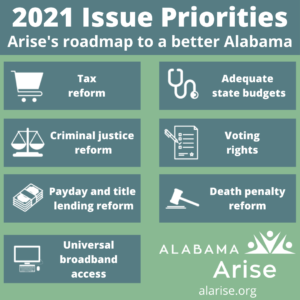Sentencing reform and universal broadband access are two new goals on Alabama Arise’s 2021 legislative agenda. Members voted for Arise’s issue priorities this week after nearly 300 people attended the organization’s online annual meeting Saturday. The seven issues chosen were:
- Tax reform, including untaxing groceries and ending the state’s upside-down deduction for federal income taxes, which overwhelmingly benefits rich households.
- Adequate budgets for human services like education, health care and child care, including Medicaid expansion and extension of pre-K to serve all eligible Alabama children.
- Criminal justice reform, including repeal of the Habitual Felony Offender Act and changes to civil asset forfeiture policies.
- Voting rights, including automatic universal voter registration and removal of barriers to voting rights restoration for disenfranchised Alabamians.
- Payday and title lending reform to protect consumers from getting trapped in debt.
- Death penalty reform, including a law to require juries to be unanimous in any decision to impose a death sentence.
- Universal broadband access to help Alabamians who have low incomes or live in rural areas stay connected to work, school and health care.
“Arise believes in dignity, equity and justice for all Alabamians,” Alabama Arise executive director Robyn Hyden said. “And our 2021 issue priorities would break down many of the policy barriers that keep people in poverty. We can and will build a more inclusive future for our state.”

The urgent need for criminal justice reform
Alabama’s criminal justice system is broken and in desperate need of repair. The state’s prisons are violent and dangerously overcrowded. Exorbitant court fines and fees impose heavy burdens on thousands of families every year, taking a disproportionate toll on communities of color and families who are already struggling to make ends meet. And Alabama’s civil asset forfeiture policies let law enforcement seize people’s property even if they aren’t charged with a crime.
Arise will continue to seek needed reforms in those areas in the coming year. The organization also will work for repeal of the Habitual Felony Offender Act (HFOA), the state’s “three-strikes” law. The HFOA is an unjust driver of sentencing disparities and prison overcrowding in Alabama. The law lengthens sentences for a felony conviction after a prior felony conviction, even when the prior offense was nonviolent. Hundreds of people in Alabama are serving life sentences for non-homicide crimes because of the HFOA. Thousands more have had their sentences increased as a result. Repealing the law would reduce prison overcrowding and end some of Alabama’s most abusive sentencing practices.
Universal broadband access would help struggling Alabamians stay connected
The COVID-19 pandemic has illustrated the essential role that the internet plays in modern life. Remote work, education, health care and shopping are a reality for millions in our state today. But far too many Alabamians, especially in rural areas, can’t access the high-speed broadband that these services require. These access challenges also reveal a racial disparity: About 10% each of Black and Latino households have no internet subscription, compared to 6% of white households.
Policy solutions can facilitate the investments needed to ensure all Alabamians can stay connected. Lawmakers can help by guaranteeing that all communities have the right to own, operate or deploy their own broadband services. The Legislature also can enact targeted and transparent tax credits to promote broadband for underserved populations.

